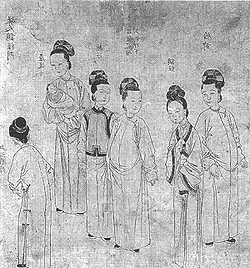In Traditional Chinese Medicine (TCM), menstrual problems are a matter of serious concern. This is partly because in ancient China, childbearing was the most important role that a woman had, and normal regulated menses signified that she could give birth to healthy babies.

Classic illustration showing different kinds of women’s conditions such as infertility, irregular menses and weakness after delivery.
Menstruation, pregnancy, childbirth and lactation are unique to women. Blood is the elementary basis of these physiological functions, hence TCM has a saying that “for women, blood is paramount.” Women’s diseases have been regarded as a medical specialty far back in history; the first gynecological monograph in TCM, Tested Treasure in Obstetrics (jing xiao chan bao), was published in AD 847〜859 AD by Zan Yin. In his literary works, menstrual problems such as heavy menses, scanty menses, early or delayed periods, prolonged periods, missed periods and menstrual cramping and so on, are categorized in detail with many effective remedies.
TCM records about missed periods can be tracked back 2000 years ago. In the Yellow Emperor’s Classic of Internal Medicine, amenorrhea was named as “non-menses women,” no menses flow,” or “withered blood.” It also listed a prescription with cuttlefish bone as the main ingredient. Other well-known classics like Shen Nong’s Classic of Herbal Medicine, Essential Prescriptions Worth a Thousand Gold, The Complete Book of Efficacious Prescriptions for Women (1237 AD), and The Complete Work of Zhang Jingyue (1640 AD) have contributed different viewpoints for this condition.
Generally, TCM believes that menses flow is mutually regulated by the kidney, tian gui, extra meridians (Thoroughfare Vessel and Conception Vessel) and the uterus. If a disturbance occurs in any of these parts, missed periods will be resulted. Moreover, dysfunction in the spleen or liver also play a major role during the development of amenorrhea. As the disharmony interfere with menses formation in the uterus and leads to missed periods.
Click to see the Women’s Physiology from a TCM perspective.
In modern TCM, physicians will first differentiate missed periods from physiological causes such as pregnancy, breastfeeding or menopause. They then take advantage of modern diagnostic techniques to exclude structural defects and identify whether it is applicable for TCM treatment.
TCM treatments for missed periods are indicated for conditions that are mostly due to endocrine issues, structural deformities such as inborn defects are not applicable.
TCM treatment goal always aims at regulating the endocrine system and restoring the normal ovulation cycle. The course of treatment may be longer, but the results are encouraging. Besides routine therapies, physicians usually suggest dietary modification or food remedies, which are beneficial to overall recovery.
TCM views on missed periods development
TCM diagnosis on missed periods
Herbal prescriptions for missed periods
Acupuncture therapies for missed periods
External remedies for missed periods
Chinese patent remedies for missed periods
Chinese food recipes for missed periods
TCM references for missed periods


